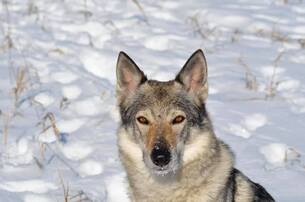|
Embark the Good: Embark is a USA based company that is quickly developing a one stop shop for most of our breeds genetic test (that can be tested through saliva) needs. Currently this one test can test for several known genetic issues within our breed, according to Embark. These tests are Degenerative Myelopathy, Multiple Drug Sensitivity, Hemophilia A variant 1 & 2, Canine Leukocyte Adhesion Deficiency Type 3, Day Blindness, Urate Kidney & Bladder Stones, Anhidrotic Ectodermal Dysplasia, Renal Cystadenocarcinoma & Nodular Dermatofibrosis, and Mucopolysaccharidosis Type 7. Most of these ailments are brought on by a recessive gene, which means both parents must be carriers. Therefore, through health testing and selective breeding we can keep them from becoming common issues within the breed. Embark also test for long coat (FGF5) and coat texture (KRT71). Long coat is a recessive trait and a disqualifying fault for the breed. Coat texture is helpful in trying to avoid breeding dogs with an open coat. Again, knowing if your dog is a carrier allows for selective breeding to avoid producing litters with a disqualifying trait. Another great feature is that Embark’s results for DM can be printed off and sent into the Orthopedic Foundation for Animals (OFA) to be recorded and fulfill that testing requirements for your dog’s CHIC number. So, you are fulfilling an OFA requirement in the process of obtaining an abundance of other helpful information about your dog. Some other fun features that Embark’s health testing provide is your dog’s coat traits, coat color, body size, and even altitude adaptation and food motivation. OFA sets a minimum of testing requirements for the breed and Embark goes above and beyond in providing breeders, owners, and Veterinarians with an abundance of additional helpful information that is essential in insuring we are breeding the healthiest litters possibly and providing the best care we can for our dogs. Embark the Bad: Embark also provides a breed identification feature. The Czechoslovakian Vlčák is “provisionally” recognized by them, which means it is still a work in progress. This is causing a slight misunderstanding as people are taking this feature as a hard and fast fact or proof of lineage. Unfortunately, that is not how this feature works. Currently there have been confirmed reports of wolfdog mixes coming back as part CSV. There lineage is known and there is no CSV in their lines. There is also reports of Embark showing 100% CSV dogs who are carriers for traits that are not found in either the German Shepherd or Wolf ancestry. This is again where the provisional status comes into play. Embark is not able to detect CSVs with 100% accuracy, currently. These issues have been reported to Embark to help them refine their breed test as it pertains to CSVs. I was able to reach out Embark as to this issue and received this response, “…genetic ancestry testing should not be used to certify a dog as "purebred" or to prove "purity" of a bloodline. The term "purebred" is not a scientific designation and "purity" cannot be determined by an individual dog's DNA. Purebred status is formally defined by a registration body or kennel club and generally requires that a dog of a nationally or internationally recognized breed has a documented pedigree recorded in a studbook. In contrast, Embark tests for a dog's genetic ancestry, as described above. That said, we are constantly growing our reference databases, and while we anticipate seeing fewer instances like what you described here as we move forward, it is important that we emphasize the difference between a result from a genetic ancestry test and a "purebred" dog.” Embark goes on to say, “This is a process that also depends on our reference dataset and generally tells us about the most likely source of recent (past 3-4 generations) ancestry. For that reason, results might differ from registration information or known pedigrees due to several sources, but they reflect our best assessment of recent ancestry at the present time.” What’s Next with Embark:
OFA currently has Pituitary Dwarfism (DW) listed as an optional test for the breed. This is quite worrisome as DW is common in the breed. The main hindrance is that no laboratory in the USA currently screens our breed for DW. You can still test for DW but you have to do so with a laboratory in Europe or outside of the USA. Then you can submit the results to OFA to be reordered but they are not needed for a dog to get a CHIC number at this time. Once we have a laboratory within the USA that is capable of testing for DW, we can hopefully make DW a mandatory test through the OFA. That is where Embark comes in to play. Embark is currently working on including DW testing for our breed, specifically the LHX3 variant. Unfortunately, at this time we do not have a timeframe for this. From Embark, “We appreciate the breeders/owners that have provided Embark with test results and samples from carrier and affected dogs, and while we currently do not need additional samples from Czechoslovakian Vlacks, the samples we have received are immeasurably valuable and useful for the future. We will certainly let the community know if we develop the capacity to test for the LHX3 variant in our lab, as we know how important this test is for several breeds.” -Jenna
0 Comments
 This is a phase I am hearing more and more as of late. I have had a few discussions with breeder friends of mine about the mentality and decided to write a bit about it. This phrase is being heard when talking about ethical breeders who health test and title their dogs. “I don’t need a breeder that does all of that, I just want a pet.” Here is the thing whether you want a breeding prospect, competition dog, or a family pet…good dogs come from the same place. Let us first talk about what make an ethical breeder. This is a subjective question, as people will have their own views. For this blog I will tell you what my view is on an ethical breeder and why I hold that view. Health testing to me is one of the two bare minimums of what a good breeder should be doing. The Orthopedic Foundation for Animals (OFA) has made this quite easy. On their site you can find a list of required and optional test by breed. (https://www.ofa.org/browse-by-breed) All test results for a dog can also be found on there by searching the dogs registered name. I have seen people claiming to have health tested dogs because they did Embark or another similar test. However, these tests do not test for everything. Mainly hip, elbows, cardiac, or eyes. They do not even test for all known genetic ailments that can be test for by saliva. So, Embark and such test are a great resource…they are NOT a one stop shop for genetic testing. Also, a good breeder will have no issues with sending you a link to their dogs OFA page. They will be open about test results and answering questions. OFA automatically posts passing scores but will only post failing scores with owner’s permission. It is a red flag to me is a breeder claims to have done hips and elbows, but they are not listed on OFA. At that point I am asking to see the certificate from OFA. They claim to have done x, y, z but are not willing to provide proof. Knowing their dog’s pedigree is the second bare minimum for me. A good breeder should be able to talk about their dog’s pedigree with knowledge. They should know the ups and downs of it and be open and willing to talk about it. No dog or pedigree is going to be perfect, but the breeder should know and acknowledge the good and the bad of their dog’s lineage. To me those two are the absolute bare minimum to say a breeder is good. Now let us talk about what (to me) makes a breeder ethical…puts them that step above.  First, I will say that temperament is not all in how you raise them. Genetics play a part; I will not debate to what extent here. To me an ethical breeder is having their dog’s temperament evaluated by an outside source. AKC has their Canine good Citizen (CGC), Community Canine, Urban Canine, Virtual Home Manors (VHMA), and they even provide temperament testing. UKC has their Socialized Pet Obedience Test (SPOT). Some breeds may not be ideal for a test like these (think working livestock guardian, not just of that breed but actual working dogs) and in those cases the breeder can reach out to other ethical and experienced breeders or judges to give them feedback of their dogs temperament and the breeder should have a few references they can pass along for you to speak to in regards to their dog’s temperament. Second is Conformation. Breeders that can show either Conformation results or titles have taken the time to have their dog’s structure, build, movement, and temperament evaluated by multiple different Judges. This provides valuable feedback in determining a dog’s strengths and weaknesses when looking at breeding them. It should be acknowledged that every dog will have their faults and an ethical breeder makes it a point to know their dogs. This allows them to select an appropriate breeding match to balance them out. Third is performance titles. Breeders that take the time to earn performance titles are showing that their dogs are trainable, and it shows their dogs level of work ethic. Also competing in performance events shows how the dog can focus and work around a lot of distractions. You can see how a dog maintains their focus and cool in a large variety of environments. (this also shows temperament) It also allows others to see the relationship a handler has with their dogs. If you are looking at or for a working dog (livestock guardian, herding, etc…) a breeder should be able to show videos upon request of the dog interacting with their charges and handler.  Now how do these fit back into the topic at hand? When I hear, “I don’t need a breeder who does all of that, I just want a pet,” or a Breeder that says, “I don’t need to do all of that, because some people are just looking for pets,” I cringe. A Breeder that says that (to me) is saying they are perfectly fine breeding and placing puppies that have the potential to have bad health, come from lines with bad temperament/health, unsound or unpredictable temperaments, poor structure/movement which will lead to poor health, is willing to breed two together that instead of complementing each other can bring out or lock in bad traits. A potential buyer that says this (to me) is saying they are fine getting a puppy that they could potentially have to spend $1,000s on vet bills, that could wind up with a crappy temperament, that doesn’t live long due to health issues, prone to injuries due to poor structure…the list goes on and on. Now, the most common comeback is, “Well, even breeders who do all that stuff can end up with a puppy that has bad hips, elbows, or temperament.” They are correct. Even if a breeder goes above and beyond genetics can still be a fickle thing. However, if you look at an ethical breeder’s overall program it happens far less than in an unethical breeding program. When it happens in an ethical breeding program the Breeder does more research, digs deeper into pedigrees, and does everything they can to avoid it happening again. The unethical breeder says, “oh well, it happens,” and they go about their day. The other comeback is the difference in price. Unethical breeders who charge far less are doing so because they are cutting corners with health testing, temperament testing, and objective evaluations of their breeding stock. So, to that I say you get what you pay for. Ethical breeders pour their heart, soul, and money into their dogs. Unfortunately, the second comeback is becoming less true. Now unethical breeders are charging just as much if not more than the ethical breeders. They are doing so by using flashy sounding made up “breed” names for mixes, using catchy words like rare/exotic color, off standard sizes like giant/teacup/micro mini, etc. Meanwhile doing little to no health testing, temperament testing, and some are breeding for recessive traits with no thought to the ramifications of that. Anything is allowed if there is a profit to be made in their eyes. At the end of the day everyone has the right to go the route they want to, but I implore you to do your research and support ethical breeders. Also, keep in mind that working, sporting, and breeding dogs in an ethical Breeder’s home are pets as well. |
AuthorAuthor's name will be on each blog post. You will hear from me as well as co-owners. Archives
March 2021
Categories |